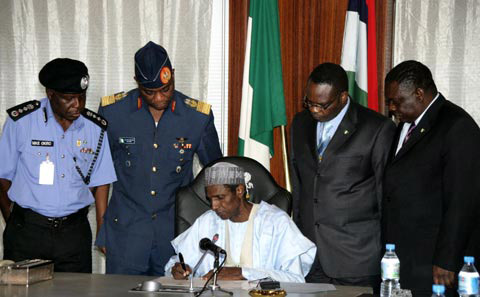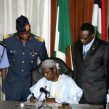
Will Nigeria’s Amnesty Campaign Have a Lasting Impact on the Delta Insurgency?
Publication: Terrorism Monitor Volume: 7 Issue: 32
By:

Soon after amnesty was offered in early August 2009, few seemed to take notice when Osama Bin Laden surrendered to authorities. Two weeks later, the leader led more than 20 of his militant followers to do the same. In an interview that day, Bin Laden said that since he abandoned his life of militancy, he had found peace within himself. The local press on the scene suggested that the young followers “looked excited to be quitting militancy and other related crime.” This news failed to reach headlines and even those who noticed expressed their doubts of any further success for the amnesty program.
This is not fiction. The “Osama Bin Laden” in question is a Nigerian militant leader who went by that name. His real name is Solomon Ndigbara. Upon surrendering in August, Ndigbara let it be known that he now prefers to be addressed as Brother Solomon, shedding his infamous nom de guerre (Vanguard, October 2).
Nigeria’s Amnesty Program
When Nigerian President Umaru Yar’Adua first announced an amnesty plan for militants in the Niger Delta in late June, the Western press tended to dismiss the move as another Nigerian sham. The amnesty program ran from August 6 until October 4. The skepticism remained up until the October deadline, when the last of the major militant leaders ended their holdout and surrendered at the 11th hour. “There had been skepticism in the beginning as to the sincerity of the proverbial olive branch dangled before the freedom fighters, usually referred to as militants,” one Nigerian journalist wrote on the day after the amnesty deadline. “Many had viewed the arrangement as a cosmetic dressing of a deep wound and wondered what would make the initiative not go the way of others in the past. But the surprising flow of the combatants into the warm embrace of peace has, indeed, confounded critics, and given hope that the serenity the region needs would return” (Daily Independent [Lagos], October 5).
Nearly all of the major militant leaders who had been advertized as the core of Nigeria’s most notorious militant group, the Movement for the Emancipation of the Niger Delta (MEND), accepted the amnesty program. However, MEND ended its 90-day ceasefire on October 16, threatening to resume its attacks on Nigeria’s oil industry. In the following days, MEND has temporized on its threats, while the Federal Government has taken the position that MEND may have been reduced to an email generating non-entity.
The MEND Umbrella
It can be difficult to differentiate between the various armed groups of the Niger Delta. In the Western press, the groups are typically lumped together under the MEND name. However, this framework for understanding the militancy in the Delta can lead to flawed conclusions about the current situation. It is worth examining the splits in MEND and the effect that the government amnesty program has had on the movement’s leadership.
Since its creation in late 2005, MEND has never been a cohesive entity. It has largely operated as an umbrella group consisting of shifting alliances among the various militant factions, key militant leaders, and low-level fighters whose camps are in the creeks of the Delta. Despite its lack of cohesiveness, MEND carries significant weight as a symbol of the militant resistance in the region.
Post-amnesty, it remains unclear who speaks for MEND and how many supporters it maintains. If MEND continues to threaten massive attacks and does not carry through on its threats, it will begin to lose its credibility as a militant force. Likewise, if the Nigerian government does not follow through on its promises to develop the impoverished Delta region, MEND’s symbolic power could gain in popularity amongst disillusioned militants.
By accepting the amnesty offer, the key militant leaders have effectively been co-opted by the government. Among them are Victor Ben Ebikabowei (a.k.a. Boyloaf), Government Ekpemupolo (a.k.a. Tompolo), and Farah Dagogo. Although never a part of MEND, Ateke Tom, one of the most notorious and feared militant leaders, also accepted the amnesty plan.
It appears that President Yar’Adua came to the conclusion that he could no longer ignore these key militant leaders. However, it remains uncertain what level of loyalty and influence the former militant leaders have, and will be able to maintain among their followers. Their acceptance of amnesty will be a true test of their influence and it will have a major impact on the chances of success for the strategy implemented by the Nigerian government.
Ignoring MEND
With MEND threatening to resume its attacks on oil installations in the Delta, a number of former core MEND commanders have suggested that the group should be ignored. They argue that the remnants of the group consist of an insignificant number of individuals sitting at their laptops, free to write and send what they want to the Nigerian and Western press. They further suggest that these individuals are trying to hijack the struggle, using the MEND brand as a way to further their own selfish interests (Reuters, October 8).
Two days prior to a scheduled meeting on October 9 between Nigerian government officials and key militant leaders who had accepted the amnesty, MEND released a statement to the press warning of future attacks. “In this next phase, we will burn down all attacked installations and no longer limit our attacks to the destruction of pipelines,” threatened MEND’s spokesman, Jomo Gbomo (Vanguard, October 11). One week later, MEND ended its 90-day ceasefire and warned of attacks to come.
According to Commander Boyloaf, MEND’s threats should not be taken seriously and what remains of the group is nothing but a “paper tiger” (Vanguard, October 11). In an interview with the Nigerian press, he was asked about the threats coming from MEND and their impact on the amnesty program. “My brother, forget about all these people who sit by their laptop and write rubbish on pages of newspaper… I have always advised the media to ignore them; if they want amnesty they should go and surrender their laptop and fill [out] the amnesty form and be part of the process. Who is Jomo Gbomo? And why is he still hiding? He should show himself if he [exists]” (Vanguard, October 11).
Finding Replacements
Boyloaf was the first of the big-name militant leaders to accept amnesty, doing so on August 7, the second day of the program (Reuters, August 7). After he surrendered, MEND announced that a replacement would take over for him (Daily Independent, August 6). Skeptics of the amnesty plan have suggested that new leaders may be found to replace all of the key commanders who have accepted the government amnesty.
Stephen Davis, Canon Emeritus at Coventry Cathedral and a former presidential envoy under President Yar’Adua, has been a vocal critic of the program in the Nigerian press. He warns that even though the key militant leaders have surrendered, this does not mean that MEND has collapsed. “The most likely scenario is that the next level of commanders will step up to the plate as they see the opportunity to make big money like those that have ‘surrendered.’ The problem for those that surrender is that when the payments run out, as they always do, their old command spot has been taken by someone else,” Davis wrote on October 17. “They then usually try to start another group, but find they need a patron or have to do some contract work to earn some money so as to recruit new boys and grow quickly so as to be strong enough to claim space. And there will be plenty of patrons and contract work as we approach the next elections. That is the way the jungle works, as does politics in Nigeria” (Next [Lagos], October 17).
Post-Amnesty Deadline
The Nigerian government has announced that approximately 15,000 militants have accepted the amnesty offer. According to the amnesty plan, those who have surrendered their arms will enter into a rehabilitation program and be given a stipend of 65,000 naira ($450) per month. (Reuters, October 8). Presumably the key militant leaders who surrendered were offered significant financial packages to provide them with the incentive to cooperate.
Post-amnesty, it is now the responsibility of the Nigerian government to follow through on monthly stipends to former militants, as well as to maintain the support of the former militant leaders who still command the loyalty of their followers. Monthly stipends were also a critical element used by the United States to enlist and successfully co-opt the Awakening (Sahwah) movement in Iraq’s Anbar Province. In Iraq, the United States was able to effectively place a wedge between the Sunni insurgency and al-Qaeda by finding key tribal and/or militant leaders with whom American forces could work. While admittedly in a very different context, a similar model has been used by the Nigerian government.
MEND and al-Qaeda as Brands
MEND as a brand and symbol of the militant struggle in the Niger Delta can be compared to the brand and symbol of an organization like al-Qaeda. Just as MEND carries the most weight as the leading militant group in the Delta region, al-Qaeda carries the greatest weight in the global community of militant jihadists. Beneath the appeal of the brand name of both groups, there are a number of tensions relating to militant ideology, organizational leadership, strategy, tactics, and short and long term goals.
Only time will tell, but it is possible that the Nigerian government has succeeded in delegitimizing the MEND brand in Nigeria, just as the most virulent elements of the “Sunni insurgency” in Iraq’s Anbar Province, often branded as al-Qaeda in Iraq, were delegitimized by Sunni tribal leaders.
Prospects for Stabilization in the Delta
There are real grievances to be dealt with in the Delta region, yet a number of militant factions have been able to hijack the struggle for their own political and financial self-interest. If the Nigerian government can continue to engage, neutralize, and co-opt these factions as well as the remaining militants, follow through on its pledges to implement a Delta development program, and begin to address some of the root causes which have led to the rise of militancy in the region, the prospects for stabilization will improve greatly.





